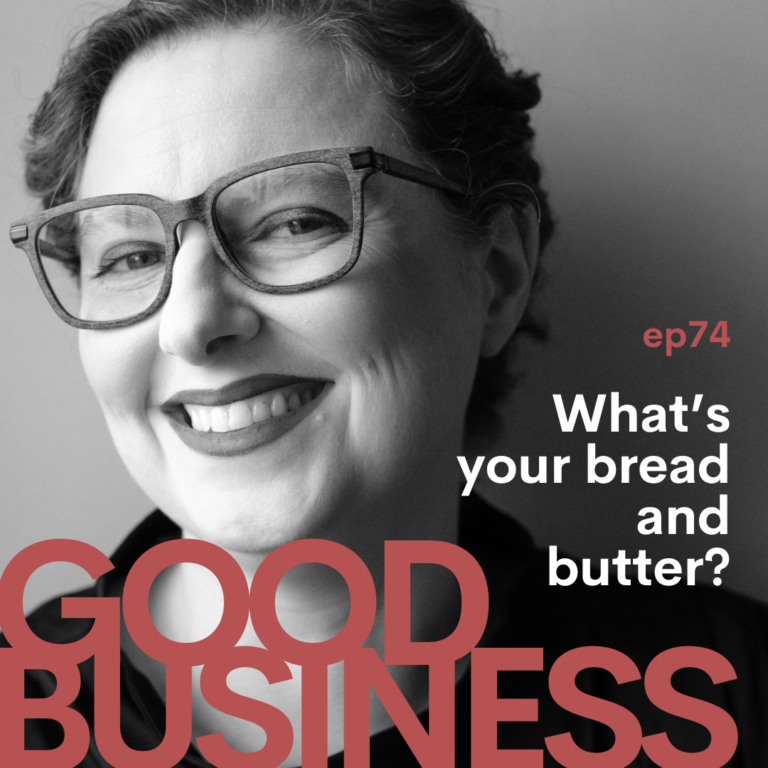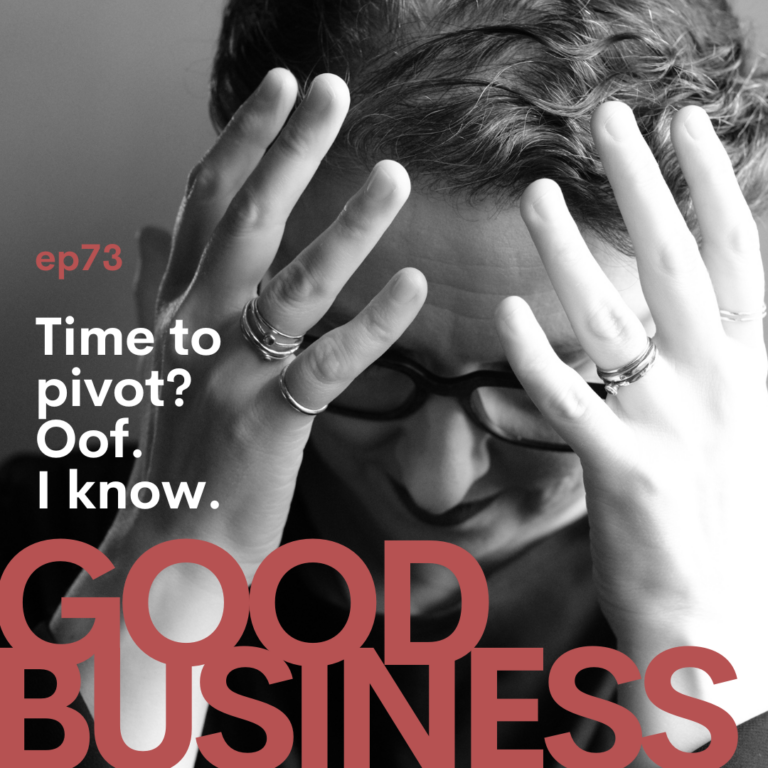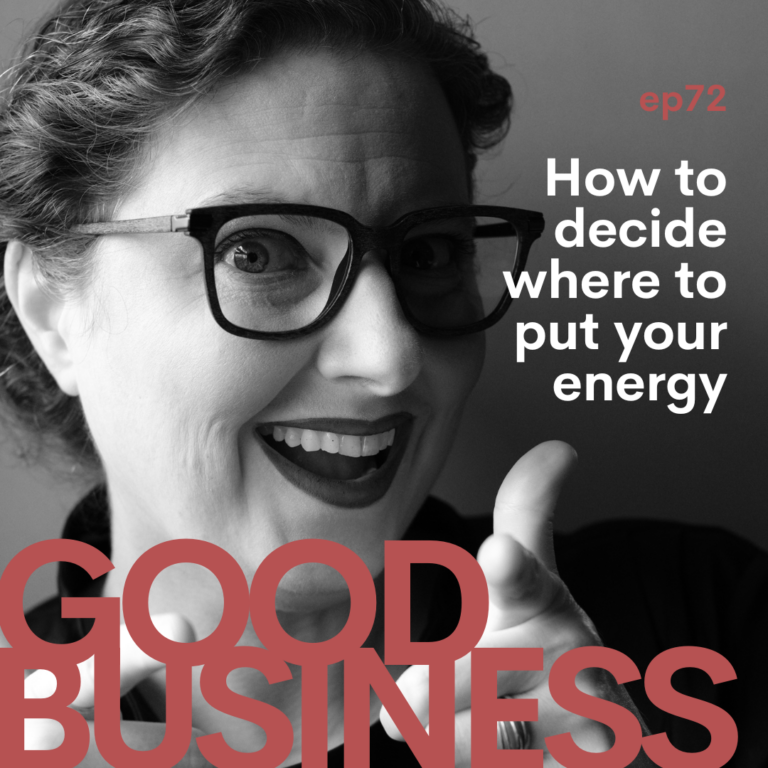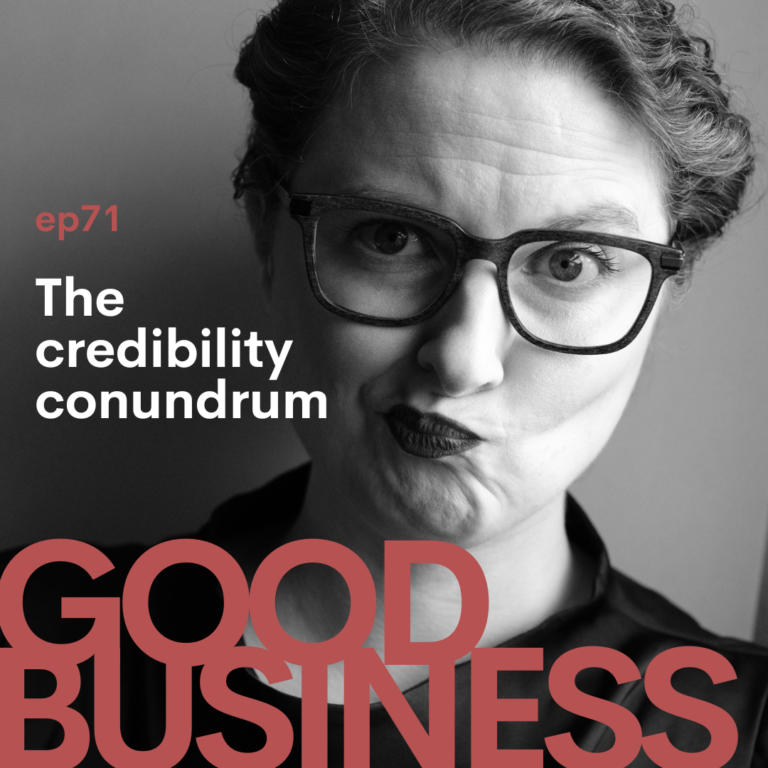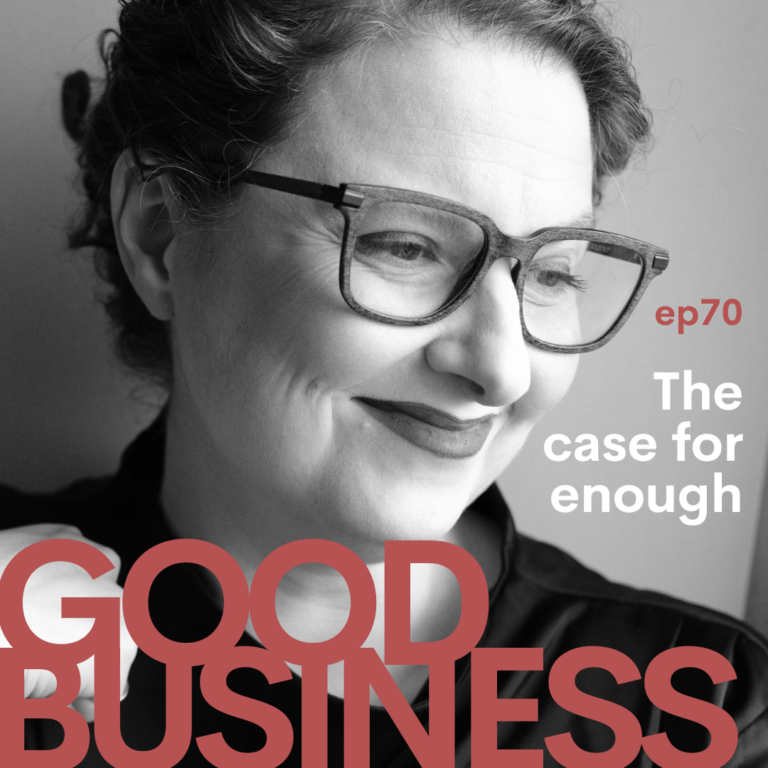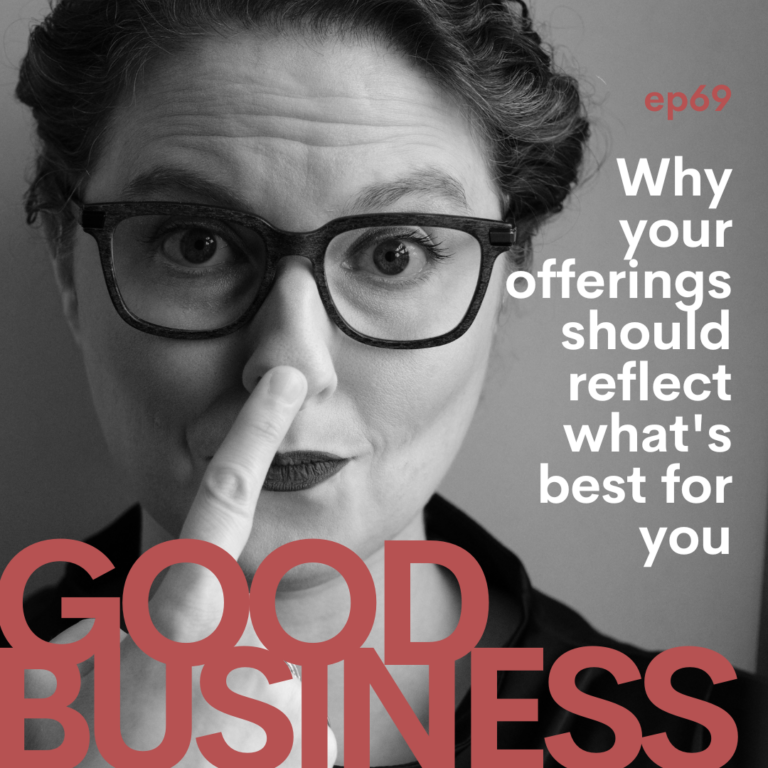Today’s episode is all about how to look a little closer at the ever-growing trend of membership sites all over the place and how to know if you should jump on the bandwagon or not.
Episode Transcript:
I’m Illana Burk, CEO of Your Life’s Workshop, coach to entrepreneurs and solopreneurs across dozens of industries and host of Good Business. With nearly 20 years experience helping hundreds of clients create profitable, ethically driven and sustainable businesses based on their life’s work, I’m here to teach you how to do great work, make great money, and make a positive impact without feeling like you need a shower afterwards.
Hello friends. It’s lovely to be here. It’s been a little while I have been working on all kinds of things that I can’t wait to start sharing with you. And that’ll, that’s all coming soon. But today I want to jump into talking about, uh, something that just came up with a client and it feels so relevant that I was like, okay, this is the thing I need to jump back in on. And that is the fact that the way we think about our businesses is changing. So God damn rapidly that, um, it felt really worth like coming here and getting this out immediately. So that what we’re going to talk about today is the, the simple truth that the way we thought about the future has dramatically shifted, right? As a result of COVID and our general changing climate, how we’re thinking about the sustainability of what we do, no matter what industry you’re in is, is evolving so fast.
We can barely keep up. We can hardly even think about what needs to happen next. And this came about as a conversation with a client of mine who has a brick and mortar business, that’s it out of necessity, right? Like what, what she does, can’t be really translated directly online. So she’s in that spot where there’s all kinds of new health protocols. She has reopened, but is dealing with a lot of health protocols that are making what she used to do, less fun, less sustainable, less profitable, less accessible to people. Um, and she’s experiencing changes in consumer behavior. She’s experiencing changes in how she even really wants to show up and is asking yourself a lot of questions about how she wants to be in her work and all of that’s happening so fast. Well at a time where we’re all kind of like holding our breath and trying to let go, what, what do we even do about what comes next?
Right. So today I want to talk a little bit about a trend that I see that I’m working with. And what many of you listening might also be kind of chewing on as business owners or aspiring business owners. And, and I want to just kind of talk about that as a, like a, is this the next shiny thing, or is this something that’s, um, a new evolution? Will it stick around, et cetera, et cetera. So what I’m talking about is creating communities. Now we have all seen lots and lots and lots of things about creating communities. So today I’m going to talk about kind of my thinking on creating community, because it happens to be something that, that, that next new big thing that I was talking about is that exact thing is that’s coming. So I’m going to talk about that, of like my own perspective.
Um, and I’m also, we’re gonna talk about why I’m here choosing to do it the way I’m doing it. Why I think it’s not the right thing for everyone, uh, how to have some realistic expectations around it. And also, um, what I think is going to happen to this trend over the next few years. And so what we’re talking about today is membership spaces, communities who they’re for who they’re not, why some of them work wise, some of them, don’t why you should do it or not do it, and what your expectations should kind of be around it. Now I expect this will be a conversation that will be ongoing, but this is kinda my starting place, my primer. So for those of you that don’t already know, I have been working diligently on a mighty networks membership community for quite a while. Now it’s going to be an educational space for holistic learning, hang around business and health and wellbeing and life, and basically being, you know, a whole human and not just a business owner.
So it’s opening very, very soon. This is not a pitch, but I’m just letting you know that this is the context of where I’m coming from. I have been deeply entrenched in that development, which is why the podcast has been on hold for a little bit, because frankly, I just didn’t have time to do everything. And, um, because that shift is happening, I also wanted the podcast to feel more connected and relevant to that new iteration of my work in the world. So that’s, that’s where I’m coming from on this. Now I will say, I definitely don’t know everything about every platform that’s out there that is, we’re not really getting into a technical choice conversation. I have chosen mighty networks is the place where I’m building mine. And I’m certain I will be doing lots of shows about, uh, the upsides downsides, what you can do with it, et cetera in the future.
But that’s just not what I’m doing today. I chose it because it really beautifully combines community and learning something that I’ve always felt yeah. Is critical to actually building good businesses is you have to have, you have to have the right people, right? You have to have the right people learning. And those two things need to be linked. And something that’s been unique about my business forever is that most of my clients have, are connected to one another over time. And many of them have business relationships that I don’t even know about now. And they’ve created these incredible ecosystems of economies all unto themselves. So I wanted to do that in a very deliberate way. I also want to create a learning space where you could learn just what you need and not take big giant programs that only have some of what you need, and then a whole bunch of stuff that you either don’t agree with.
Don’t want don’t need don’t ever look at. So the membership space, I’m keeping things very simple. Um, and again, you’ll have lots of information about that soon, but I, I just want to give you guys a little sense of like, okay, this is where I’m coming from. I have a bias. I like mighty. It is not perfect. It does not do everything I want it to do. Um, which has been really frustrating for me, but it does most of what I wanted to do. And I also have several clients that are working with it as well, many of my recommendation, but, uh, people are coming in creating communities because that seems to be the next big thing. Right? So that’s what we’re going to talk about today is the next big thing is creating membership spaces. Actually, the next big thing, you know, back when I started blogging was all the rage.
He pretty much just had to have a blog. And then that became completely accepted. It wasn’t, it was no longer a niche thing. It was like, if you’re going to be in business, you have to have a blog to support it. Well then blogging kind of, you know, has moved out of the, like the thing, right? And now it’s podcasting and podcasting is how you promote yourself. I resisted that for a long time, because most of what I heard in podcasting was, you know, fluffy nonsense. And I wanted to create something that gave people a little bit more than that. And I, I hope I’ve done that. I get a lot of good feedback that I actually teach things. And I feel like you guys learned things from the feedback I get. So that’s, you know, yeah, right now community building though, is getting kind of regarded that in that same vein of like, is this the next big marketing thing?
Now my stance is it’s the next big trend. It is not a marketing tool. It’s a business model. And that’s a very, very important differentiation is that creating a community is not the same as creating a podcast or having a blog or, uh, having a great Instagram presence or having a YouTube channel. Those are marketing tactics. They are, they could be strategic choices, but they’re, they’re tactical, right? You can have a business without those things. Having a membership space is a revenue model. It’s a way of actually getting people into your business and paying you directly in many cases in most cases, right? Same thing with course development. Now those things everybody is doing, but not everybody should be doing because for a couple reasons, for one thing, not everybody’s expertise lends itself well to courses and not everyone’s skill level or temperament lends itself well to community building.
It took me a very long time to feel like I had the skill, know how personal sense of leadership commitment to actually wanting to show up with that level of regularity and empathy and general ability to objectively listen to what my communities need to feel like. That’s something that I could make a central part of my business model. And that’s, I mean, when I say it took me a long time, we’re talking like it took it up like, you know, eight years. And before I really felt that now seeing is people are not making that choice with that understanding that having a community is not like having a podcast, you know, you can stop podcasting for a few months and then you start again and people listen again, you cannot blog for a while. And yeah, your, you know, your open rates might go down, but people will read again, if you have a community and you decide to go camping for a couple of weeks and nobody’s watching the store, people will wander off and they will never fucking come back.
They just won’t. It’s like, they need to feel like you’re there. You know, like you are somebody who shows up and, you know, turns the keys in the door every day. You can’t expect people to, um, continue to be a part of your community if you’re not showing up with like real, authentic desire to be there. So that’s a really big, big difference because I think a lot of people with COVID, especially everybody’s moving online and people are seeing dollar signs and they’re creating these communities that they don’t really realize what they’re biting off. They don’t realize the level of leaders that’s needed. They don’t even really know what that means. They’re looking at formulas, they’re launching first and creating second. Um, they’re doing, you know, whatever to get stuff out. They’re not recognizing that this is kind of their one chance to get this really right.
And they’re not even considering it, the level of facilitation and presence. And, uh, I’ll say this again, Tivity that is, is vital to actually creating a community that people can thrive in because what they’re looking at is the upside for their business and what they’re creating. And they’re not really looking at the fact that if you’re going to successfully create a community, you have to create a dramatic upside for the people in it. And you have to do it over and over and over again. And you have to be constantly responsive to what they need to change, what works for them, what doesn’t, what’s, you know, when to stay out of the way and when to jump in. Uh, and it’s basically, so what I’m seeing a lot of is people creating with the wrong goal. In mind, they’re creating it as a, as like a, I can make money at this and take my thing online and they’re not going, am I the right person for this?
And am I good at it? And do I want to show up with this level of intensity and regularity and do I have the space and time and energy to actually do that? And they’re coming at it from a space of like really, really unrealistic expectations of how long it takes and how many eyes you have to dot. And T’s, you have to cross in order to like, make it, you know, more deeply functional and work long term. So I’ve spent a lot of time talking some of my clients into creating communities and I’ve spent an equal amount of time talking some of them out of it and what I’m helping people do right now and what I’m encouraging. All of you, dear listeners, I love saying that, uh, to do is to contemplate what three years out looks like if only for a second, if you can, like, if you’re somebody who’s out there and you’re contemplating creating a community or maybe doing your first course before you invest the time and energy in going down that road, close your eyes for a second and think about what it will feel like three years from now, how will your circumstances shift from where you are right now?
And I know right now everybody’s like, how do I even get through the fucking election? Right. They were looking at like, what will tomorrow be? Not what will a year from now be, or two years from now or three years from now, if you’re somebody who’s listening and you occupy a brick and mortar space, um, this exercise will probably make you shit, your pants a little bit, because three years from now could be very different. It will likely, never be the same as it was. I think we all understand that. Now we see that now that, uh, the status quo is probably gone. Ordinary is never going to be quite the same shape as it was. And we’re all kind of recalibrating to that. And now, now that we’ve sort of settled into that normalcy. Now we can start going, okay, well, if that, if this, what if this is normal?
What if this is just how it is for the next two years, three years, will you be able to survive with what you have and if not, is, you know, community I’m using air quotes here, um, is that the right solution for you? Or is that just the one that everybody’s doing? You know, we see lots and lots of promotion for it. Everybody’s kind of doing it and, and what will be the backlash of everybody doing it? That’s, that’s the other part of this to consider is that if everybody’s creating communities, then eventually people will really get burned out. It’s hard enough to even get people to contemplate leaving Facebook for basically anything new. If you are one of many in someone’s general, um, you know, peer group, I guess, orbit, uh, if you’re one of many, that’s creating a community, they’re gonna probably get fatigued and stopped joining them.
You know, I, uh, I compared this earlier today on the same call with the client that it’s like the war, the streaming services right now, you know, like today, when I’m recording this it’s prime day and I’m getting all the promotions of like, join all of these new channels and Amazon’s offering like 99 cents for all these different channels. And so my husband and I were like, well, let’s try them out for 99 cents for a couple of months, I’ll give them a shot and I’ll just put it on my calendar and cancel. And we don’t like them. So we signed up for all these things. Then we start looking around. I’m like, okay. So I have to try to remember where to find Peppa pig for my five-year-old, you know, like what channel did I sign up for that? Has that okay? Is it, is it noggin?
Is it epics? I don’t know. Right? Like, so I’m going through this whole thing of like, yay, we unplugged from cable, but now I don’t have a remote control. I just have to remember in my brain where, what lives, you know, I suspect a very similar thing will start to happen for people in membership spaces. And the backlash of that is that everyone’s going to end up back on Facebook, right? If we’re not careful. And what I mean by that, if we’re not careful part, what I’m endeavoring to encourage and create is kind of more hub spaces, spaces that do more than just one thing, which means pulling your resources, looking to other people who maybe do something ancillary to what you do, that instead of creating you each create membership spaces, you each create communities. You look for ways to maybe create some pods or you look for ways to go.
Um, you know, I’m a healer and I know someone who is a psychologist, and I know someone else who is, um, you know, especially as, as the meditation. And I know someone else who specializes in X or Y or Z, right? Like things that are kind of loosely related, that the same maybe type of human might be interested in all of those things and pull your resources, figure out a way to create a collective dynamic so that you’re not all independently competing for the same few bucks a month. And you’re not all trying to sell to your same communities over and over again, to the point that nobody wins. You know, it’s like that. Um, if you ever saw that movie in the nineties, beautiful mind with Russell Crowe, that by the way, does not hold up. Well, I try to watch again, reasonably, not so much, but there’s that great scene where they, he talks about like mathematically, if every, if all the boys go for the blonde, then nobody gets the blonde and all, because all the girls around the blonde feel like they’re unwanted.
So then nobody wins. This is kind of that your potential client is the blonde. If everybody goes around the blonde and you all go for everyone else and you do it collectively and you work together, then perhaps you have a chance for ongoing success, which also helps with that facilitation thing that I touched on at the beginning of the call, where you might not all be good facilitators, you might not all be good group leaders. You might absolutely fucking suck at understanding what your people need. Now. I know that that sounds harsh and you’re probably sitting there going, no, I know what my people need, but really do you, do you understand what their behavior needs? Do you understand how much time they want to spend with you? Do you understand the difference between I’m offering something that everybody I meet tells me is really great, and they would love to have it and something that’s the actual sellable version of that, because those are two different things.
Can you look objectively at what you create to know whether or not it’s actually going to be, uh, effective from a behavioral standpoint? Like, I’ll give you an example. I’ve been working like crazy to create my network and I’m, I am doing it all myself, because I really want to learn all the ins and outs of how every single thing functions, mostly because of what I do for a living. I have a lot of asking me questions and it’s important to me to understand how every tool in something like that works before I deploy it, because I know people will be asking me questions about it, just as you know, by default, I’m a business coach, right? People are going to ask me stuff. So, um, there’s a section of mighty networks about, uh, about topics, right? Where you set up your topics. When you’re setting up your space.
Now the topic section, it’s kind of like categories. If you have WordPress, it’s like, you know, these are, these are the neighborhoods in which people can, um, you know, classify their articles or ideas. I had, I think, I don’t know, six or eight topics that I was going to work with. And it, I ha I redid them, I think four times, five times maybe. And they took me two or three hours to do each time. Now that’s going to sound insane. And those of you who have actually set this up and mighty networks, you’re like, how the fuck can you spend that much time doing topics? Uh here’s how, okay, because this I’m figuring it out. Which meant that the first time I did it, I didn’t realize that I didn’t need to lay, you know, text over the top of the graphics that mighty networks is going to put their own text over the top of the graphics.
Then I had to redo them again. Well, then I realized that I needed the imagery to say more about what the topic was. Well then, so I needed to do them again. So then I needed to figure out like, okay, behaviorally, if the image crops out this way, when it’s used on this thing over here, then how are new participants going to experience that versus participants who have maybe been there for a year? So you’re thinking really, really far out. And you’re thinking about all these different pieces, simultaneously, the goals, the needs, the understanding of every possible user. Well, I had to objectively look at like, Hey, Hey, it’s midnight for the third night in a row. I’m still working on this and I have to redo it again because I missed something. Now multiply that by a hundred. If you can’t objectively, look at your work and be willing to throw out hours and hours of work, because it’s just not right.
Then you’re going to create a space. That’s not right. You’re going to create a space that isn’t, that doesn’t do what it needs to do in order to get to the thing that you actually wanted, which was a more sustainable business. So I’m looking at community building as like this, basically, if you’re not already ready, willing, and able to look at your business wildly, objectively as a CEO, not as a, this is my life’s work. And this is my bliss, which I understand the irony of, you know, your life’s workshop is what I am. But a part of what I do is that your life’s work requires you to become a CEO of whatever that work is. It’s, it’s a combination of both bliss and objectivity, and that’s complicated. And if, once you actually understand that, that, that those two things have to exist in the same space in your head and your heart and your mind and your soul and all of those places, then you can start understanding what your resources truly are and how to, how to really deploy effectively.
So if you don’t know that you can do that. If you don’t know, if you can look objectively at the needs of your people, then you don’t know yet that this is the right choice for you. If you think that you want to get a membership site up in a, you know, 30 days, um, more power to you, go sign up for Stu McLaren’s thing and help tell you all about how to have your first membership space without any content. And you’ll launch it like crazy, and you will spam your friends and you will follow the patterns of like I’m at a launch a thing, and here’s my founding price tag. And then I’ll build the parachute on the way down the cliff. Um, there is something to be said for that, and I’m not knocking it. I’m just saying it’s not a sustainable model long term, in my opinion, unless you are going into that again, looking objectively at whether or not you have the chops for it.
So yes, you can totally go that route. And you can launch quickly with very little but likely that’s the wrong choice, likely fast and loose is not going to help you get something strong and sustainable built on a foundation that you can grow off of likely building something like this should take six months to a year likely you should be looking much further out and how building something like this will, um, interplay with whatever else you want to accomplish. It requires that you stop looking at your business as a day to day enterprise, and you start looking at it as a sustainable longterm enterprise. That’s how people who really think about business strategy, think about their work. So I’m challenging you to do that. And I’m challenging you to think about that as, um, as something different than how do I get online? How do I make money online?
How do I get out of this cycle of finding clients and get online? I promise you creating a membership space is not the magical, immediate answer to all of your problems. It’s just not, it might be the answer, but it’s not. If you feel like you’re doing it with a gun to your head, so consider that, um, and consider whether or not you actually want to be a facilitator, a guide, a teacher, a leader, a hand holder, in addition to whatever else you already are. If you don’t want to, then you will not be successful longterm as a group leader, you will not be successful if you don’t know that that’s what you’re in for. If you don’t have the facility, the are the faculties, the temperament to do all of those things on an ongoing basis to be present, to give freely of yourself and your time, you won’t get what you want out of this.
You might make some cash up front, and then you’ll have a bunch of people that stick around in your group and never participate. And, uh, you’ll have people that keep paying because they don’t know how to cancel their subscription, or they forgot all about it. And you’re going to have a few people that are super active, but they won’t actually make you much money and you’ll lose interest. If you’re somebody with a serious case of shiny object syndrome, I do not recommend investing this much time and energy and creating something like this, because you’re going to have to conquer that. You’re going to have to deal with your shit around that because once you’re in and you’ve created something and you have people showing up on a regular basis, you gotta be able to get excited about that every day. You have to know that and find a way to do that in a bake it right in.
So that’s my primer on, um, on membership spaces and what I kind of think about that and what I see about that. And as I said, very, very soon, I’m going to be launching mine, uh, because I gave it all of that thought and I contemplated it and work towards it for literally years. It’s something I’m extremely proud of and am very, very excited to share with people. It’s going to be the most, um, affordable and grounded way to work with me. I have a lineup of incredible guests that will be doing workshops with me on a regular basis. And it’s going to make what I do accessible to so many more people. And that feels really magical and really amazing. And if you aren’t already connected to me in other places, please make sure that you subscribe through my website @thegoodbusiness.co or through your life’s workshop.com, uh, and make sure that you are on my list because I will be doing fun things like launch specials and a lifetime membership for low press and all that stuff.
And I promise it will be not the ordinary launch of like, Oh my God, so much urgency. It will not be anything like that. It will be some really fun emails with probably some good jokes and nasty words in them going, Hey, look, I did a thing. Do you will be invited to come and hang out in the thing and it will be useful and it will be things that you need. And if you like hanging out with me here, I promise you will like hanging out with me there. And, um, I hope you do. So if you have questions, if you want to be a part of that, please make sure you subscribe. This is not something I beg of my people very often, but I think that you’ll dig it. So if you dug this call, if you really want to kind of play with me more in that kind of way, then please go find me there. Um, and I wish you guys all the best. I know COVID is fucking nuts and the election is impending and things are really complicated right now. And I really aspire and hope to be able to be here with you more in supporting you in your growth and in your life’s work. Thank you all very much for being here with me and spending your time with me. It means the world have a good one.
Thanks so much for hanging out with me today. For more information, visit www.thegood business.co or www.lifesworksdev.wpengine.com.
More Episodes
GB74: What’s your bread and butter?
Welcome back to Good Business. I’m your host, Illana Burk. Today, we’re talking about the most central parts of your work. The things that always feel true. The things that consistently make money. The things that people always...
GB73: Time to pivot? Oof. I know.
Welcome back to The Good Business Podcast. I’m your host, Illana Burk. Today, we’re talking about the very complicated moment when you realize that it’s time to make a significant change in your work. And these moments are never...
GB72: How to decide where to put your energy
Welcome back to Good Business. I’m your host, Illana Burk. Today, we’re talking about decision-making. Specifically, how do you decide where to put your energy around self-promotion when resources feel limited...
GB71: The credibility conundrum
Welcome back to the Good Business Podcast. I am your host, Illana Burk. And today, we're talking about credibility. What is it? Why do you need it? And how do you establish it in the age of the internet when you can...
GB70: The case for enough
Welcome back to the Good Business Podcast, everybody. I am your host, Illana Burk, and today we are talking about enough. So we begin with one word, and that word is more. That's what we're all supposed to want, right?...
GB69: Why your offerings should reflect what’s best for you
We’re diving into a topic that might just flip the script on how you think about your offers: “Why Your Offerings Should Reflect What’s Best for You Before They Reflect What’s Best for Your Clients.” Sounds counterintuitive. I know. Well, stick around because I’m gonna break it down in a way that’s both practical and super powerful.
First, I’m going to talk about what all this has to do with niching and marketing, then I’ll explain exactly how to do this, and finally I’ll dig into how this improves your leadership positioning.

